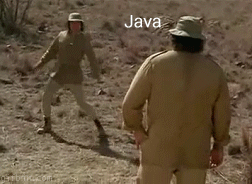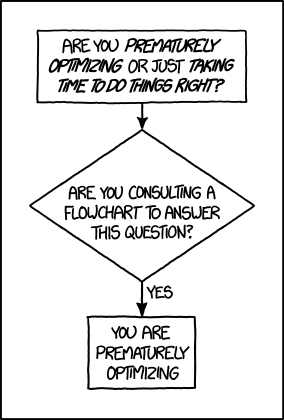That list should change significantly when Haskell starts being used for the web. Sad to see so much VB, Perl and Ruby around.
Random programming talk | I have no Structs on my List
What are people going to use Haskell for? Will it replace any of the current popular languages?
Woo! The new iOS update boosts the frame rate of my next game from 17 to 60. iOS9 has been horrible for development.
the functional paradigm will see increased popularity in general, I think. ∗
both elixir and haskell will see growth in popularity thanks to their potential in effectively handling concurrency at scale and the lower number of bugs that tend to result from code following a type-safe, functional paradigm. †
∗ in my opinion…
† in my opinion…
Haskell has been around a long time, Erlang (which Elixir is based on) is also very very old. I agree that FP is increasing in popularity, but I honestly feel JS and popular libraries that push for FP are helping FP more than Haskell and Erlang.
Regardless, even as FP increases in popularity, it isn’t new and will not become the standard or majority.
With all due respect, I didn’t say Haskell and Erlang are pushing FP.
I said FP is being pushed and Elixir/Haskell will see increased usage as a result.
I quite agree that JS and popular libraries are absolutely the primary force pushing FP. I think it will become the standard, especially as the next generation of devs emerge without decades of OOP doctrine.
I’m not saying this as a critic of OOP. I started out in e-commerce bridging IBM midrange servers and .NET. I’ve long been an OO dev. I just prefer the functional style and I think OOP will die out and FP will take its place.
But I’m no seer, I’m sure I’m utterly wrong and everything will just be full-stack JavaScript written in any old way. which would be fine, since that’s what I do at the moment. I’m just… optimistic.
We are ultimately in agreement, I also enjoy FP and have had enough experience with OOP to see the beauty of it.
I think Elixir will help with FP, since it makes it much more approachable. Haskell is what it is.
I have no idea what things will eventually be, but JS seems to continue to only expand, both in who is using it, and what they are using it for. So I can only surmise that it will continue to be popular until something can usurp it.
Udemy courses are cheap again, until Jan 11. I will probably pick up the Blender course that I skipped last time.
I started an intro to programming class at college. The material are the very basics, the fundamentals (sequence, repetition, selection structures, etc). The class is using visual basic.
There is an older lady who sits next to me who is probably in her 50s or 60s, and she has a programming degree. She is very knowledgeable about programming, and has been programming since the days of using those cards you’d insert into machines. Very interesting. There are more girls than I would have expected to see in a programming class.
Would this be sufficient code?
[code]
repeat 5 times:
walk forward
if the box is red, do this:
jump over the box
otherwise, do this:
throw the box out of the way
repeat until you are directly in front of the chair:
walk forward
repeat 2 times:
turn right 90 degrees
sit down[/code]
Sure, that looks like pseudocode examples of a for loop, an if/else statement, a while loop, another for loop, and finally and end.
N = 1
Do
lblOut.text = lblOut.text & "Hello "
N += 1
Loop Until N < 5Wouldn’t this loop 3 times?
N = 1
Do Until N < 5
lblOut.text = lblOut.text & "Hello "
N += 1
LoopAnd wouldn’t this loop 4 times?
4 times for first one.
Start
N = 1
Loop 1
text = "Hello "
N = 2
2 < 5 = true
Loop 2
text = "Hello Hello "
N = 3
3 < 5 = true
Loop 3
text = "Hello Hello Hello "
N = 4
4 < 5 = true
Loop 4
text = "Hello Hello Hello Hello "
N = 5
5 < 5 = false
End
Start
N = 1
1 < 5 = true
Loop 1
text = "Hello "
N = 2
2 < 5 = true
Loop 2
text = "Hello Hello "
N = 3
3 < 5 = true
Loop 3
text = "Hello Hello Hello "
N = 4
4 < 5 = true
Loop 4
text = "Hello Hello Hello Hello "
N = 5
5 < 5 = false
End
Notice the first loop checks N after the loop, while the first checks before the loop.


